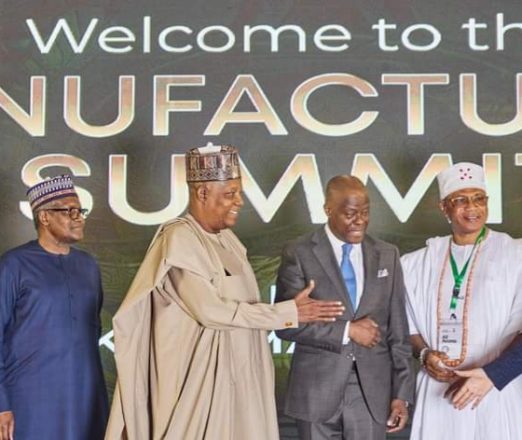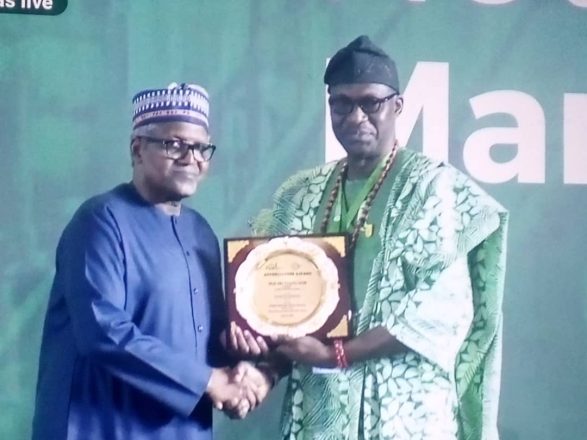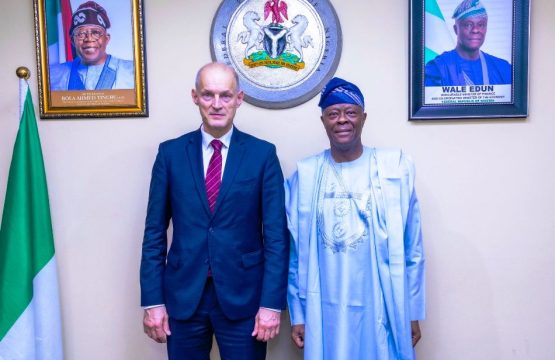▪︎ VP Kashim Shettima, Aliko Dangote, and Olusegun Aganga.
The Federal Government’s anxiously waiting to implement the recommendations from the Nigeria Manufacturers Summit, said the Vice President, Kashim Shettima.
This is even as Africa’s richest man and foremost industrialist – Alhaji Aliko Dangote, and Dr Olusegun Aganga, the guest speakers at the summit, tagged ‘ Rethinking Manufacturing,’ tells the government: “The time to act is now.”
At the July 2- 4 summit organized by the Manufacturers Association of Nigeria (MAN), Shettima, said : “My dear manufacturers, the government alone cannot drive the transformation that the industry needs.
” We need your collaboration, your investment, innovation, etc., we need your commitment to quality standards.
We cannot shy away from the need to adhere to manufacturing standards in driving forward our industries.
On the part of the government’s and through our deliberate policies, we are here to support you the manufacturers.
‘ We need your partnership to build a nation that is self-sufficient in the productions of quality Industrial products.
It’s Been Tough On All of Us
” I must confess it has been tough on all of us from the global economics uncertainty to the local infrastructural deficits, high inflation, weak backwards integration, high exchange rate and shortages of raw materials supplies.
” I deeply appreciate your resilience, commitment and partnerships.
I believe that together, we can achieve great things in the sector.
I assure you of our continuous readiness to collaborate with you , to listen to your concerns and to act on your recommendations.
” I charge you our esteemed manufacturers let us work together to build a country that is proud of it’s manufacturing strength, proud of its products and proud of its market.
While I declare the summit opened , we are eagerly awaiting to implement the recommendations from the summit. “
10% Manufacturing GDP Unacceptable, Go for 20%

◇Picture: Aliko Dangote, President/ CEO Dangote Industries Limited; Vice President Kashim Shettima; Wale Edun, the Minister of Finance and Coordinating Minister of the Economy; Francis Meshioye, President of MAN, during the Nigeria Manufacturers Summit, in Abuja.
VP Shettima, referenced the current contribution of manufacturing to the economy’s GDP: ” It is not up to 10 percent of our domestic product., it is not our desire and it’s not acceptable.
Let this Summit’s be committed to increase it to 20 percent by the end of 2025, and increase it further by 5 percent in the following 3 years to 25 percent by 2028.
” I understand that to achieve this, we must address the infrastructure deficits, acces to finance, and power supply, etc.
All hands are on the deck to bring down the cost of doing business and provides incentives for manufacturing development.”

▪︎Aliko Dangote, and Segun Ajayi-Kadir, DG MAN
Investors Protection Policies
Aliko Dangote, submitted that Nigeria has all it takes to develop and sustain a globally competitive manufacturing sector.
He said that however, the Federal Government must initiate deliberate industrial policies that assure investors of support and protection.
He said: “Such policies are the greatest incentives for all existing investors, and manufacturers, both local and foreign.
Foreign investors and manufacturers would be attracted only when they see that local investors are also doing well.
What attracts foreign investment is not when the President or any other government agencies go outside the country to seek for foreign investment.
I am recommending that government policies should support, and protect existing industries so that others will know that their investments will also be protected. Are there any better incentives than that? I don’t think so.
So, I humbly submit that an industrial policy that assures investors of support and protection is the greatest incentive for all investors both local and foreign,” he said.
This will help in resolving other challenges such as infrastructure deficit, market instability and market economic issues such as inflation and foreign exchange volatility.
“However, ignoring all these facts is what gives rise to foreign investors leaving the country in droves,” he said.
On Bank loans to investors, Dangote said that the current 30 percent interest rate is stifling growth and there is no way anybody can create jobs.
The business magnate emphasised: “To do so, we must rethink our industrialisation policy. We must look to leading countries in the West and the East who are protecting their domestic industries.
We must similarly, introduce policies to protect our domestic industries and nurture them into home champions that will create the jobs and prosperity we desperately need. The time to rethink our industrial policy is now,” Dangote said.
Declare Manufacturing A National Priority Sector
Dr Olusegun Aganga, the former Minister of Industry, Trade and Investment, urged the federal government to declare the manufacturing sector a national priority sector and back it up plans, policies and money.
” One of the major way to strengthen the Naira is to become export- oriented economy. It’s important that we address this.”
“That is the only way Nigeria will become prosperous. This is the only way we can transform our well- endowed country from being a potential to posterity.
” Some people may say that the current macroeconomics environment is very difficult for any country to industrialise let alone be competitive but Malaysia, Indonesia and China, were worse than this when they embarked on their own industrial programmes but look at what they have achieved today. If they can do it, Nigeria can certainly do it , not just do it but we can do if better and we can do it quicker. After all, in the 1950s and 60s, before the advent of the oil and gas export, Nigeria exported more tonnages of manufactured products to the UK than any of the Asian Tigers countries, according to the UK shipping data.
Consistently Implement Industrial Plans Like The Asian Tigers
Nigeria may not be able to compete with the China today but by rigorously implementing our updated industrial plans, and addressing the constraints I have talked about, Nigeria can certainly position itself as a manufacturing hub in Africa,” he said.
Dr Aganga, also recommended the following action plans for implementation to fastrack the development of the Industrial sector of the economy:
10 Must Implement Action Plans
1. FG should design a macroeconomics framework to be implemented by a strong management team that will be accountable to the President.
2. The government should eliminate excessive customs duty, levies, multiple taxation and over regulation by multiple regulators with overlapping mandates.
3. The MSME sector is always critical when you talk about manufacturing. This sector has not been given the enough attention it deserves. It is important to reconstitute the National MSME Council set up by the Vice President as required by the SMEDAN Act, to facilitate the growth and competitiveness in the sector.
4. We have to look at manufacturing broadly, but at the same time, it is important that we focus on export- oriented manufacturing. One of the major way to strengthen the Naira is to become export- oriented economy. It’s important that we address this. In 1980, both China and Nigeria each account for 1 percent of global world exports. However by 2023, China accounts for 16.6 percent of the global non- oil export , while Nigeria accounted for less than 0.03 percent. China has grown richer and its currency the Yuan is much stronger.
5. We should tackle multiple taxation and over regulation by multiple agencies with overlapping functions.
6. Another pillars is to invest heavily in industrial infrastructure. Another problems of Nigeria non oil export is standards. Poor compliance with phytosanitary measures, has caused Nigeria to have one of the highest rejection of agricultural products bring exported to Europe and the United States of America.
7 . Earlier, Aliko Dangote ,talked about finance. I want to emphasize on that in three dimensions: Access to finance, affordable finance and availability of finance. These are the three problems affecting finance.
Finance in the economy is insufficient. Few years ago, thetotal loans disbursed by the Bank of Industry over a period of 12 years was significantly less than the annual demands of the Manufacturers. That tells us how insufficient the finance is , in the economy.
8. Local patronage is another pillar, but it is not about the policies to buy buy the problem is about compliance. Lack of compliance by the Executive arm of the government- the National Assembly, and by all of us. And the solutions are not about policies and laws but compliance. We should have effective processes for monitoring compliance.
9. Education and skills cannot be left out , though it’s not one of the pillars but you need people who have the education and the skills that are relevant to your economy.
Today, we don’t have them. What Pakistan, Brazil , and Singapore does is that every two years, they do skills gap survey to determine the gaps through school curriculum, because you need them.
Innovation and Technology: The advancement of IT to manufacturing will enhance productivity and productions.
In the future, countries will not be differentiated by whether they are developing, or developed; they will be determined by innovation.
10. Nations fail if the corporate governance institutions are weak., manufacturing will fail if the institutions set up around manufacturing are weak or do not exist. The institutions exist in Nigeria but they are weak.
It’s important to make sure that we strengthened them.
I will assure you that if we make corporate governance a national goal in the public sector, it will have a dramatic effect not only on the economy but on the manufacturing and the country’s overall.
So, the time to act is now; if we act decisively and I know we can, then the opportunities are huge. We have the potential to become the top 10 producer and exporter in some strategic sectors. ” ▪︎










